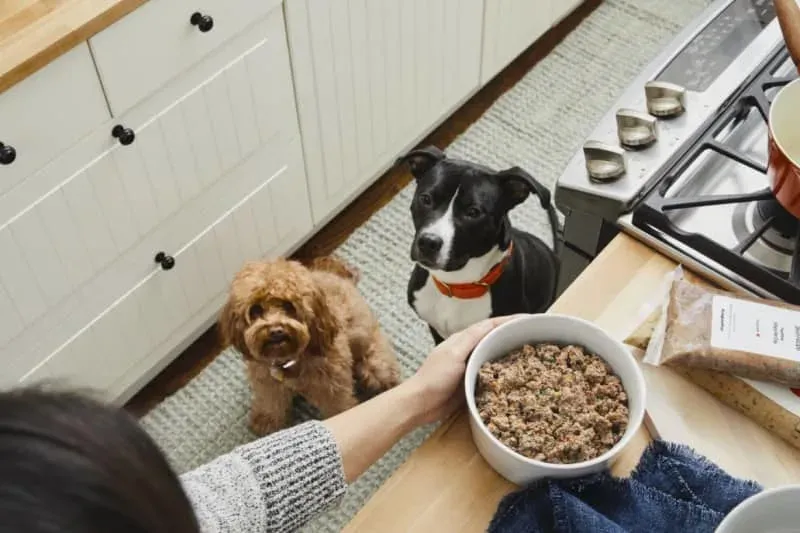If your beloved canine companion turns their nose up at mealtimes, you’re not alone. Dealing with a picky eater can be incredibly frustrating for pet parents, leading to concerns about whether your dog is receiving a nutritionally balanced diet to support their overall health and growth. Beyond the immediate worry of an empty bowl, there’s the constant fear of fluctuating weight, which can eventually lead to significant health complications. When faced with a fussy eater, the most effective approach is to get to the root of the problem promptly. Often, finding the Best Tasting Dog Food is key to turning mealtime struggles into enjoyable experiences for your pet.
“If a dog has a picky appetite, I always tell patients to make sure that their dog doesn’t have an underlying disease,” advises Dr. Carly Fox, senior veterinarian at NYC’s Schwarzman Animal Medical Center. She recommends getting your pets seen by their vets immediately for routine bloodwork and an exam to rule out any systemic issues that could be affecting their appetite. Once health concerns are excluded, it’s time to implement healthy eating habits and explore palatable food options. Addressing behaviors like coprophagia, or stool eating, can also be part of establishing a healthier overall diet and reducing pickiness. If you’re concerned about this behavior, consider resources on what can I give my dog to stop eating poop.
Why Your Dog Might Be a Picky Eater
Picky eating in dogs can stem from various factors, often behavioral. Dr. Fox notes that “Fussy food habits can be a behavioral problem.” Your dog might simply enjoy variety in their diet, or they may have a preference for certain textures, needing a switch from wet food to dry food or vice versa to pique their interest. When introducing a new diet, Dr. Fox recommends a gradual transition over three to five days. This allows your dog ample time to adjust to new flavors and textures, making acceptance more likely. Experimenting with moist toppers can also significantly enhance the palatability of dry kibble, making it much more appealing.
For dogs with sensitive stomachs, like Dr. Fox’s own pet, a prescription diet from commercial food brands such as Hill’s Science can be highly beneficial. These specialized diets are formulated to regulate the gastrointestinal tract and are often designed to be highly palatable, ensuring your dog finds them delicious – a definite bonus for any picky eater. Understanding what influences your dog’s preferences is the first step toward finding the best tasting dog food that meets their nutritional needs.
Establishing Healthy Feeding Habits for Fussy Dogs
Many pet parents dealing with picky eaters fall into the trap of overfeeding, trying to compensate for their pet’s reluctance to eat. This approach, however, carries significant risks. Dr. Fox emphasizes, “Obesity is a huge problem in our pet population and can shorten a dog’s lifespan up to two years.” Beyond reduced lifespan, obesity makes dogs susceptible to developing serious conditions such as cancer, arthritis, diabetes, and urinary stones.
To ensure your dog maintains a healthy weight and consistent eating habits, Dr. Fox strongly recommends adhering to a strict feeding schedule and performing regular weight checkups. It’s crucial to follow the feeding chart provided on your dog’s food packaging, which specifies the recommended amount based on their age and weight. “Your dogs can’t go to the cupboard to feed themselves, so it’s really up to the pet owners to feed them in a healthy way,” she adds. This disciplined approach is essential for preventing both under-eating due to pickiness and over-eating, helping you establish a routine that encourages your dog to eat what they need. Furthermore, ensuring your dog isn’t eating inappropriate items can also contribute to better overall eating habits. To learn more about discouraging undesirable eating behaviors, consult resources like what can I feed my dog to stop eating poop.
Choosing Appetizing and Healthy Treats
When selecting treats for a picky dog, the focus should always be on low-calorie options to avoid contributing to weight gain or further disrupting their regular meal appetite. If you’re opting for treats from your own kitchen, choose healthy vegetables such as carrots, snap peas, cauliflower, and broccoli, which offer nutrients without excessive calories. For store-bought treats, look for low-calorie or dehydrated varieties made with minimal ingredients.
Dr. Fox cautions that “Giving too many treats can also lead to fussy food habits.” Therefore, moderation is key, and being mindful of the treats you select is paramount. High-quality, appropriate treats can be part of an overall strategy to make food more appealing without undermining healthy eating routines.
What Not to Feed Your Dog: CBD and Table Scraps
Navigating the array of available pet products can be daunting, especially with trends like CBD being incorporated into everything from pet treats to meal options. While anecdotal evidence for CBD’s benefits in pets with joint disease or other conditions sounds promising, Dr. Fox strongly advises avoiding the CBD aisle for now. “Anecdotally, it sounds promising, and it will have a place in vet medicine at some point soon, but currently it’s completely unregulated,” she explains. Given the lack of regulation, the safety and efficacy of CBD products for pets are not yet consistently guaranteed.
As for table food, Dr. Fox’s stance is unequivocal: “it’s a complete no-no.” Replacing commercially available dog food with human-grade options from your refrigerator can lead to gastrointestinal upsets and, more dangerously, inadvertent toxicity from ingredients harmful to dogs. While occasionally offering a small piece of plain cooked chicken on top of their kibble might seem harmless, it should be considered a rare treat and is not highly recommended. This practice can reinforce picky eating habits and introduce foods that are not designed for canine digestive systems. Understanding what meat should your dog never eat is crucial for their safety and health. It’s equally important to know what foods not to give puppies to prevent early onset health issues.
Top Recommendations: The Best Tasting Dog Food Subscription Services
For pet owners continually seeking the best tasting dog food to satisfy their picky pups, veterinarian-approved fresh meal subscription services have emerged as excellent solutions. These services focus on providing highly palatable, human-grade food that can often entice even the most reluctant eaters.
Ollie: Fresh, Human-Grade Meals for Picky Eaters
 Ollie fresh dog food meals in vacuum-sealed packaging
Ollie fresh dog food meals in vacuum-sealed packaging
Ollie offers high-quality, freshly prepared, human-grade dog food that is designed to be virtually irresistible for even the pickiest of pooches. Their process begins with a detailed quiz where you provide information about your dog’s breed and age. Based on this, Ollie recommends a customized plan tailored to your dog’s specific nutritional needs. You also have the flexibility to adjust the protein sources and the proportion of your dog’s diet that Ollie comprises, ranging from 25 percent up to 100 percent. Plans typically range from $2.50 to $4 per day for small dogs and $7 to $12 for large dogs, with new customers often receiving significant discounts, such as 50 percent off their first two-week starter box. Ollie also offers a money-back guarantee, allowing you to try their service with confidence. Meals are delivered fully frozen in vacuum-sealed packaging with dry ice, ensuring freshness for up to six months. Available meal options include beef, chicken, turkey, and lamb, complemented by nutritious ingredients like kale, spinach, sweet potatoes, and peas.
The Farmer’s Dog: Tailored Nutrition with Delicious Proteins
 A bowl of fresh dog food from The Farmer's Dog
A bowl of fresh dog food from The Farmer's Dog
The Farmer’s Dog provides meal kits packed with mouthwatering animal protein, making them another excellent choice for picky eaters. Their service also starts with a comprehensive quiz, gathering information about your dog’s eating patterns and preferences to create customized options. You can choose from various recipes featuring proteins like turkey, beef, and pork, all of which include fish oil and a proprietary nutrient blend for complete nutrition. All meals are made fresh and delivered within days in eco-friendly packaging, emphasizing quality and sustainability. Trial plans for The Farmer’s Dog start from approximately $2 per day and can go up to $12 per day, depending on your dog’s age, size, and breed, and always include free shipping. New customers can often take advantage of special promotions, such as 20 percent off their trial order.
In conclusion, addressing a picky eater requires patience, a clear understanding of potential underlying issues, and a commitment to establishing healthy routines. By consulting your veterinarian, maintaining a strict feeding schedule, choosing appropriate treats, avoiding harmful foods, and exploring high-quality, palatable meal options like those offered by Ollie and The Farmer’s Dog, you can significantly improve your dog’s eating habits. Ultimately, providing a balanced and delicious diet is fundamental to ensuring your beloved companion lives a happy, healthy, and fulfilling life. Explore these options and consult your vet to find the best tasting dog food for your furry friend.
